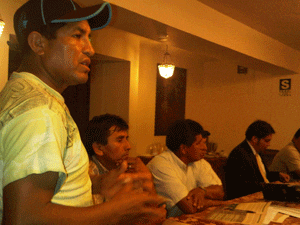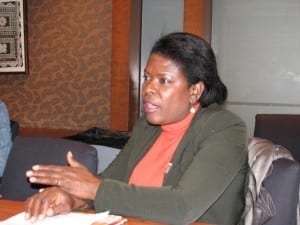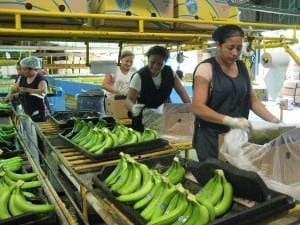Mar 13, 2013

A judge ordered Fidel Polo (left) reinstated to his job after he was fired for speaking out about poor working conditions. Credit: Samantha Tate
Fidel Polo Sanchez, a union leader fired for speaking publicly about the egregious conditions of farm workers in Peru, should be reinstated to his job, a judge ruled this week. Sociedad Agrícola Viru, one of Peru’s largest agricultural export plantations, fired Polo July 12, 2012, for “defamation.”
Polo, legal defense secretary for the Agrícola Viru Workers Union, was leading a campaign to change a labor law launched as a “temporary measure” in 2000 to foster the growth of new exports. The law enables employers to offer sub-minimum wages and provide fewer benefits and protections than those provided to other private-sector workers under Peruvian labor law. The law has enabled the plantation to become one of the most profitable companies in Peru’s booming agriculture-for-export sector.
The agricultural export industry employs some 300,000 people, more than 70 percent of whom are women who toil between 12 and 14 hours a day in miserable conditions. These workers are often denied their right to freedom of association through anti-union practices.
On May 15, 2012, Polo appeared on a local television program to talk about the campaign and discuss Agrícola Viru’s failure to provide safe and decent working conditions despite workers’ sacrifices. In response, plantation management alleged that Polo had stated falsehoods about the company, including, “[workers] have to buy their own safety equipment” and “[we work in] in inadequate conditions.”
In fact, the Peruvian Ministry of Labor has repeatedly fined Agrícola Viru over the past three years for failing to provide workers with proper safety equipment, for denying labor inspections and for egregious working conditions.
The company also filed a criminal charge against Polo, and that case is still pending.
Mar 12, 2013

Agripina Hurtado discusses the goals of the new Afro-Colombian Labor Council. Credit: Tula Connell
Afro-Colombians are far likelier than other Colombian workers to earn less than the minimum wage and to be employed in jobs where they cannot form unions to improve their working conditions. And all of this exclusion “has a strong current of racial discrimination under it,” said Agripina Hurtado, the newly elected president of the Afro-Colombian Labor Council (Consejo Labor Afrocolombiano). A quarter of Colombia’s population is Afro-descendant, yet Afro-Colombians comprise more than three-quarters of the country’s poor.
Many Colombians neither recognize nor acknowledge discrimination against Afro-descendants, Hurtado said, and the council is working to raise awareness among lawmakers and the public about their working conditions. For instance, roughly 75 percent of the workforce in Colombia’s ports—primarily Afro-descendent—is employed under flexible non-labor contracts and consequently not allowed to join unions or bargain collectively.
Further, threats and violence against Afro-Colombian leaders and communities are causing high levels of forced displacement, especially along the Pacific Coast where large numbers of Afro-descendants live. Colombia is the deadliest country in the world for union activists, with 4,000 trade unionists murdered in the past 20 years, many of them Afro-Colombian. “The selective killing of union members is spreading fear” throughout the Afro-Colombian community, she said.
Founded in July 2012, the Afro-Colombian Labor Council seeks to promote the rights of Colombia’s Afro-descendent workers. The council includes representatives of the country’s three large trade union federations: the Unitary Workers Center, Central Única dos Trabalhadores (CUT); the Workers’ Confederation of Colombia, Confederación de Trabajadores de Colombia (CTC); and the General Workers Federation, Confederación General del Trabajo (CGT). The federations represent workers in the palm and sugar cane industries, as well as domestic workers, public-sector and port workers.
Hurtado said one of the council’s big goals is to ensure that port workers, sugarcane cutters and other workers who are currently hired casually or under subcontracting arrangements are hired under the formal labor contracts that the law requires. That way, they will be covered by the nation’s labor laws and allowed to collectively bargain with their employers. Some 65 percent of Afro-Colombians in the informal sector and 29 percent in the formal sector make less than the minimum wage, according to an in-depth study of the Afro-Colombian labor situation in four major Colombian cities by the National Union School (ENS), a Solidarity Center partner.
Speaking through a translator at the Solidarity Center in Washington, D.C., Monday, Hurtado said the government is taking steps to acknowledge the needs of Afro-Colombians, but only because of pressure from the international community. Overall, the government “doesn’t really take these issues seriously.” The council is working at the national and local levels of government to “insert the issue of racial discrimination into the discussion on wages and worker issues,” she said.
Hurtado, a leader of the public sector union USE (Union Sindical de Emcali), said one of the biggest obstacles is getting members of the Afro-Colombian community to self-identify as Afro-Colombians and join together to fight for their rights on the job and in their communities.
“We aren’t conscious we have these rights, and we don’t go out and fight for them. The government doesn’t recognize us because we are not organized.”
Hurtado and the Afro-Colombian Labor Council are working hard to change that.
Mar 7, 2013
Although post-apartheid South Africa has one of the most progressive constitutions in the world and women comprise more than 40 percent of Parliament, the country also has high rates of gender-based violence, including “excessive rates of female homicides,” according to the World Health Organization.
Most recently, the brutal rape and murder of 17-year-old Anene Booysen in February and other high-profile killings have brought the issue of gender-based violence to national attention. Two men have been arrested for the death of Booysen, who worked at a construction company in a small rural town southeast of Cape Town, South Africa.
Around the world, in their homes and at the workplace, women are highly likely to experience violence—up to seven in ten women globally will be beaten, raped, abused or mutilated in their lifetimes. This March 8, International Women’s Day, activists across the globe are focusing on ending violence against women—and in South Africa, working women and their unions are among the leaders in events across the nation.
Demanding a “proactive, transparent strategy to halt the rape and violation of women and children,” the Federation of Unions of South Africa (FEDUSA) in February laid out steps toward a national strategy to combat the epidemic. “Violence against women is a harsh reality in South Africa,” says Martle Keyter, FEDUSA vice president of gender. Booysen’s murder and all such acts “perpetuate the violent disregard of women’s constitutional and universal human rights to equality, freedom and safety,” she said.
Members of FEDUSA and the Congress of South African Trade Unions (COSATU) are heading up rallies and other events across South Africa. (Follow their actions on Twitter with the hashtags: #NoToRape #StopRapes #COSATU.)
In commemoration of International Women’s Day, the International Labor Organization (ILO) is highlighting the issue of sexual violence at the workplace and includes the experience of Sisandra, 28, a telecommunications technician in South Africa. “My executive manager came to the office and asked for my number and I gave it to him,” Sisandra said. “I did not ask him why he wanted my number as he is a senior person and respected by all in the company because of his position. He then started touching my breast and private parts … I felt violated and scared. Even though I said I was going to report this, I felt I could not because I thought I could easily lose my job if I told.”
As in many nations, researchers say the culture of violence against women in South Africa involves a combination of “a historical culture of ‘might is right’…an unequal relationship between women and men, lack of adequate childcare … and high male unemployment.” Underlying all of these issues is economic inequality, in which a large swath of the population has diminishing or no access to family-supporting jobs and to fundamental rights, an explosive and injurious environment that frequently undermines people’s view of themselves and those around them.
The United Nations Commission on the Status for Women is meeting now in New York to review previous resolutions and take new steps toward the elimination of discrimination against women. A 100-member trade union delegation of women from Italy, Senegal, Canada, the United Kingdom, Morocco, Brazil, Singapore and other countries is attending the meeting as part of an
International Trade Union Confederation (ITUC) delegation. The ITUC is demanding governments “live up to their international and national obligations on the prevention and elimination of violence against women and girls.” The ITUC says that last year, the commission “failed to reach agreement because of conservative governments questioning the very principle of gender equality.”
On the blog, FEDUSA Writes, a poster notes that “the regular headlines witnessed in South Africa of women young and old, poor and rich, black and white getting beaten, raped, or murdered,” mean that “it is time for us to call on our Government to turn their political rhetoric and timely outrage into concrete actions…. We desperately need to find ways in which to change our behaviour, change the patriarchal nature of our society and radically shift the existing power relations that make it necessary for men to be tough and violent in order to really be men.”
Mar 6, 2013
As friends and family hold a memorial service today for a Mozambican man who died after being handcuffed and dragged behind a South African police van, unions are denouncing the death and calling for continued action to investigate the tragedy.
The South African Police and Prisons Civil Rights Union (POPCRU) “condemns the actions of several police officers” involved and says the union is “mortified by these actions which demonstrate the opposite of what the men and women in blue represent.” POPCRU, an affiliate of the Congress of South African Trade Unions (COSATU), represents 80,000 members of the South African Police Service.
Both POPCRU and COSATU support the efforts by the South African Independent Police Investigative Directorate in moving quickly to investigate. COSATU also notes that the preliminary results of the directorate’s post-mortem “are consistent with the version that this man was dragged and possibly assaulted.”
Video footage taken on February 28 by an eyewitness shows Mido Macia being tied to the back of the van and dragged along the street. Macia, 27, later died in police custody.
The Workers Organization of Mozambique is calling on South Africa to “take strong and punitive measures to “punish the perpetrators, compensate the bereaved family” and take steps to ensure such an incident never happens again.
Mar 6, 2013

Credit: STITCH
In Honduras, a country where women laboring in fruit packing plants and textile factories endure especially difficult conditions, two union leaders are empowering women to take on important roles in their unions and their communities.
Irís Munguía began toiling at a banana packing plant at age 18, living on the banana finca (plantation) as a condition of employment. After 22 years at the plant, the longtime union activist now heads the Honduran banana and agricultural worker confederation, COSIBAH (Coordinadora Sindicatos Bananeros y Agroindustrales de Honduras), founded in 1993. Munguía also is the first female coordinator of COLSIBA, the Latin American coordinating body of agricultural unions.
Evangelina Argüeta Chinchilla also started work at a young age. At 15, she was hired at a maquila, where she toiled for nine years before being fired, likely for her work in the union. Now, Argûeta is coordinator of organizing maquila workers in the northern Choloma region for the General Workers Confederation (CGT), which includes seven unions that represent 10,200 maquila workers.
Speaking through a translator, both women described their painstaking efforts to develop awareness among working women and men about the rights of women on the job and in their unions. Munguia’s work began in the 1980s, when she was part of the local union, SITRATERCO. She and other women sought greater participation in the decision-making processes of their unions, but faced obstacles that included cultural norms dictating against women taking leadership roles. In the late 1980s, Munguía was selected by the International Labor Organization (ILO) as one of two women to take part in a training series on cultivating gender equality in the countryside. Those trainings took place every three months over two years.
She then began her decades-long work educating union members and empowering women, first through SITRATERCO and then COSIBAH. These “train-the-trainer” sessions reached an ever-larger group of workers. For instance, when Munguía held workshops for those on SITRATERCO’s women’s committee, participants returned to the plantations where they trained more women. Munguía and other women unionists have held countless trainings, many involving both women and men, in which gender equality issues are a subtext in education around literacy, media work or union governance. Munguía has gone on to help form a women’s coordinating committee in COLSIBA to reproduce across Central America what they have accomplished in Honduras. COLSIBA’s leadership practices what it teaches: Unions must elect at least one women for every COLSIBA committee.
“I hope to see more women participating in the country’s political processes, advocating for legislative proposals that will benefit us as women,” says Munguía. She also hopes leadership and empowerment training leads to “more women participating in union leadership positions, more women involved in the development of proposals and strategies that benefit women in their unions.”
Argüeta Chinchilla has taken a similar approach among women in the maquila industry. She and other women unionists hold leadership trainings with assistance from women’s rights organizations and the Solidarity Center. In one factory, for example, 43 women have participated in an entire education and leadership course, and Argüeta Chinchilla is now working with other unions to bring more women into the program. She hopes to see women “exercising power proportional to the numbers we represent in the world, in the labor movement.”
Honduran maquila unions have seen several successes in recent years, despite what activists say is increased government repression since a June 2009 presidential coup. In November 2009, Russell Athletic agreed to rehire 1,200 workers in Honduras who lost their jobs when the company closed the factory in an attempt to bust the union, after the union—with support from the Solidarity Center and the United Students Against Sweatshops—convinced 110 U.S. universities to cut their apparel contracts with Russell. And last year, Argüeta Chinchilla says workers formed two new unions in the apparel sector. At one garment factory, the new union signed its first collective bargaining agreement covering 1,200 workers.
Both women agree that the biggest challenge in developing women leaders is overcoming the machismo culture within unions. In Choloma, where five women are union leaders, Argüeta Chinchilla says they are reaping such success in their union education and outreach among maquila workers that even men have to admit they are doing good work. Munguia, who says men often see women’s leadership as an affront to them, says the key is to build consciousness among men by sowing seeds of support among a few men—“and of course, training women to stand up for themselves.”



